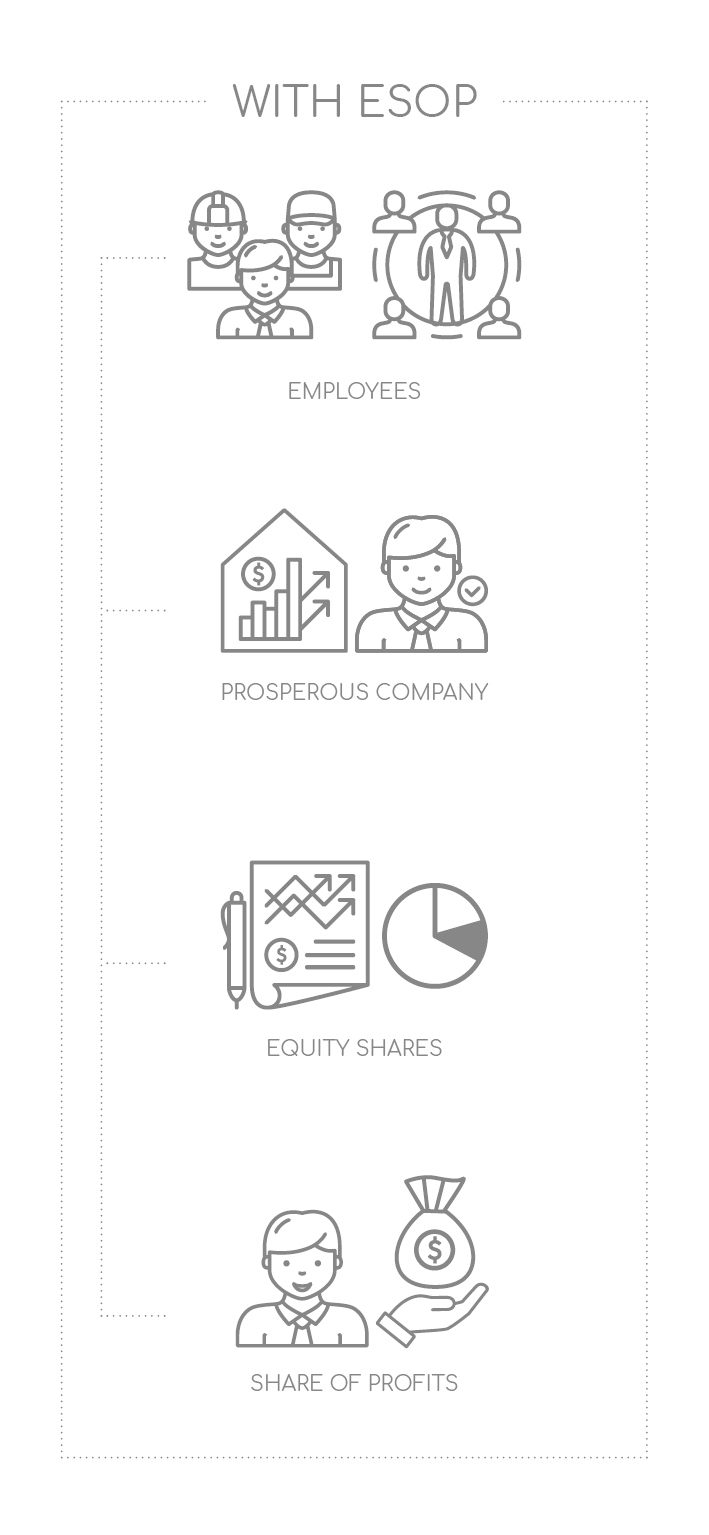Brief introduction
An Employee Stock Ownership Plan or Employee Stock Ownership (Participation) Plan (ESOP) is a benefit plan that provides Employees or co-workers with an ownership interest in companies, particularly a share of the company's profit.
It is a corporate finance strategy that aligns the interests of Employees with those of shareholders.
In establishing and administering an ESOP, it is typical to use the services of an independent third party.
Our company - the Trustee of Share and Equity Schemes - can support any entity or corporation interested in establishing and administering such a scheme.

What we offer
We offer a set of turnkey services that include:
Consultation, drafting and review of documents - share and ownership programs
Administration of Share and Ownership schemes
Implementation of the policy, motivation of Employees
Opening and maintenance trust bank accounts
Recording and maintenance of accounts
Filing tax returns and ensuring tax compliance
Reporting
Further outsourcing of services you wish to entrust to professionals
What Stock and Ownership plans (ESOP) bring
- Employee ownership is commonly used to attract and retain Employees, to build long-term wealth, and to foster a high-involvement work culture where Employees are empowered to think and act like owners.
- ESOPs motivate Employees, increase productivity, improve retention, maintain local employment, contribute to the corporate longevity and offer other benefits.
- ESOPs offer many benefits to businesses, owners, Employees and communities.
Fast Facts on ESOPs
ESOPs increase Employee engagement
No extra contribution required
Higher Employee income


What is Employee ownership?
- Employee ownership is a term describing any arrangement in which Employees own shares of their company or a right derived from the value of shares.
- Employee ownership is a broad term, taking many forms from a simple grant of shares to highly structured schemes. The most common form of Employee ownership is an Employee Stock Ownership Plan (ESOP), under which Employees hold shares indirectly and/or through a corporate Trust.
- The purpose of an ESOP is to give Employees the opportunity to obtain company shares on favourable terms or benefits deriving from the value of shares, witout having to invest their own funds (although that is also an option).
- ESOPs enable Employees to participate on both current and future economic rewards of ownership.
- ESOPs are better incentive schemes compared to other alternatives.
- ESOP flexibility provides not only for an investment into own company shares, but also for investment diversification into a broad range of opportunities, creating a valuable retirement asset.
ESOPs have proven to:
Increase Employee income
Become increasingly popular among Employees around the world
Reward Employees for achieving the goals set
Increase productivity
Motivate Employees
Reduce Employee turnover
Maintain local employment
Help combat social disparities
Contribute to corporate health and longevity
What is ownership culture?
Almost every ESOP wants to have Employees who think and act as Owners.
Convincing research and decades of experience from United States of America show that Employee ownership is in fact a powerful tool to improve the corporate performance - but only when companies employ "ownership culture", under which Employees think and act as Owners.
This means much more than being nice to Customer, reducing waste, showing up on time for work or working hard.
Research shows that an effective ownership culture is one that generates a lot of ideas from well-informed and highly engaged Employees. Companies that employ these highly engaged idea-generating cultures generate additional growth.
Creation of ownership culture includes:
- Providing an opportunity to a share of ownership that has a potential to significantly contribute to Employee financial security.
- Providing Employees with education on ownership, process of generation of profit and their role in it.
- Sharing of overall corporate performance data, broken down to individual work groups.
- Communicate profit through incentive schemes, profit shares or other tools.
- Building Employee participation not only by giving them an opportunity to contribute with their ideas and information, but also by creating a high commitment culture. It is worth the effort.
Legal advice
Equity Legal s.r.o. is available to provide advice and assistance in all aspects of ESOP transactions, ESOP management and distribution.
FAQ
What is Employee Stock Ownership Plan?
What does ESOP mean for start-ups?
Employee direct involvement lies in the fact that the Employee holds direct share in the company in the form of corporate stock for example.
ESOPs secure future stock, attribute short-term or medium-term stock favourable once pre-established criteria are met, such as:
> Your startup meets certain goalss
> Your startup obtains funding
>Your startup is listed on the stock Exchange
> The length of employment reaches certain level
> Your start-up is sold
These criteria can be individually established to accommodate both parties and in such manner that enables to predict when they will be met.
With ESOPs you can give special credit the Employees and make your startup more attractive to potential Employees by including ESOPs in the range of benefits sufficiently attractive to Employees that you would not be initially able to cover by remunerations based on the goal met.
